Kitchenware Retailers
Pryde’s Offers Kitchenware Shoppers Old-Time Customer Service
By Robin Mather
Tucked into a tree-filled neighborhood called Old Westport in Kansas City, Kansas, Pryde’s Kitchen & Necessities is a wonderland for the curious cook.
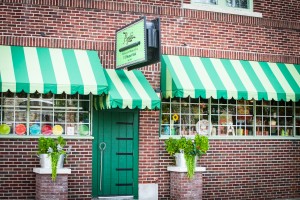 Its fans say things like, “The store is clean and the displays are beautiful and never messy, and you can tell the employees love working there,” and “So much stuff, it almost feels like a hoarder’s paradise.” Owner Louise Meyers says tour buses visit the store, filled with tourists who have come from far away to the store they know as a mecca for the kitchen-obsessed. “Forty percent of our customers come from out of town,” she says. “They say, ‘It isn’t Christmas until you’ve been to Pryde’s.’ “
Its fans say things like, “The store is clean and the displays are beautiful and never messy, and you can tell the employees love working there,” and “So much stuff, it almost feels like a hoarder’s paradise.” Owner Louise Meyers says tour buses visit the store, filled with tourists who have come from far away to the store they know as a mecca for the kitchen-obsessed. “Forty percent of our customers come from out of town,” she says. “They say, ‘It isn’t Christmas until you’ve been to Pryde’s.’ “
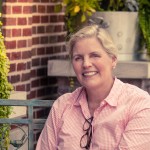 Meyers is the daughter of John and Connie Perucca, who decided, in a conversation at their kitchen table, to open their own store in 1968. The Peruccas had a thousand dollars – and four kids, which made the venture a little risky, she says.
Meyers is the daughter of John and Connie Perucca, who decided, in a conversation at their kitchen table, to open their own store in 1968. The Peruccas had a thousand dollars – and four kids, which made the venture a little risky, she says.
Still, they opened a shop and ran it for four years before moving the business to its current location at 115 Westport Road. Regulars recognize the store’s signature green-striped awnings and the huge whisk that serves as a handle on Pryde’s narrow green door. Its cheery red-and-white checked logo of a rooster decorates the sign and its shopping bags.
 Now the store is three stories – “if you include the attic,” Meyers says – and 10,000 square feet of culinary wonderland. The building housing Pryde’s is “an iconic Kansas City treasure,” Meyers says, and has been written about in Architectural Digest magazine –which called Pryde’s “a hardware store for cooks.” The store has also been featured in Southern Living, among other magazines both national and local.
Now the store is three stories – “if you include the attic,” Meyers says – and 10,000 square feet of culinary wonderland. The building housing Pryde’s is “an iconic Kansas City treasure,” Meyers says, and has been written about in Architectural Digest magazine –which called Pryde’s “a hardware store for cooks.” The store has also been featured in Southern Living, among other magazines both national and local.
“It was built in 1922, and was the home for the Helen Thomes School of Dance,” she says. “It was a burgeoning community at that time, and Westport has always been a melting pot. Wagon trains heading west stopped here in Westport.”
Showing off a photo of the dance instructor whom she calls “Miss Thomes,” Meyers says “80-year-old women who studied with Miss Thomes still come in to say that the building’s satisfyingly creaky original wood floors remind them of their childhood dance classes.” The stairway to the second floor also houses photos of some of those dancers in their heyday, and Meyers sounds almost as if she’s talking about one of her own children (she has six) when she says, “That one went off to the New York Ballet, and she used to come back to Kansas City just to visit Miss Thomes.”
Meyers’ ability to retain and retell such facts serves her well in the business.
“This is the only job I’ve ever had, and I can’t imagine a better one,” she says. Every day is different, with a fresh challenge.” Meyers began working in the store when she was eight years old, sweeping floors. She worked with her father for 27 years before she eventually bought the business from him, although she considered other careers, including communications and the idea of becoming a labor and delivery nurse, before she made the decision. When she bought the store in 2001, she tripled the inventory, she says.
Thousands of Items
The store’s floors are jam-packed with gadgets, linens, pots and pans, specialty cookware, coffee and tea pots and accessories and more. Pryde’s offers the largest selection of Homer Laughlin Fiestaware in the Midwest, says Meyers, and she’s also obviously proud of the large selection of thick maple cutting boards made by a Missouri company called C & C Woodworks.
 One whole room is devoted to shelf after shelf of cake plates and baking supplies, including everything from rolling pins to cake pop pans. Pryde’s also is known for its large offering of the highly prized Mosser Glass items, including jadeite and colored milk glass serveware. The store, while crammed with merchandise – it even hangs from the ceilings – is carefully curated and artfully arranged, and staff can lead you quickly and easily to glassware, or mugs, or dessert plate sets, or whatever it is that your heart desires.
One whole room is devoted to shelf after shelf of cake plates and baking supplies, including everything from rolling pins to cake pop pans. Pryde’s also is known for its large offering of the highly prized Mosser Glass items, including jadeite and colored milk glass serveware. The store, while crammed with merchandise – it even hangs from the ceilings – is carefully curated and artfully arranged, and staff can lead you quickly and easily to glassware, or mugs, or dessert plate sets, or whatever it is that your heart desires.
Pryde’s doesn’t offer classes, but does occasionally do demonstrations and book signings, she says.
The Value of Brick and Mortar
Pryde’s does a large wedding registry business, Meyers says, and an employee will accompany the couple around the store as they make their selections. “Wedding and gift registries bring younger people into the store, and that gives us a chance to form a relationship with them,” she says.
But sometimes that kind of backfires. She remembers a customer who came in with her fiancé and asked a lot of questions about some of those Mosser Glass cake plates. Meyers patiently answered her questions until the woman finally said, abruptly, “I can probably get it cheaper on Amazon.”
“You need to write something about that,” she says, the heat of the memory reddening her cheeks. “People really need to support their local stores.” If customers don’t support local businesses, they’ll eventually end up with only chain stores to choose from.”
Small local businesses also can’t do as much for online customers as the big Internet retailers. “It’s impossible for a single brick and mortar store to have a multimillionaire website,” she says.
Buying decisions are about more than price, she says. They’re also about service, and about ties within their community. Some of her vendors have been working with Pryde’s for more than 40 years, she says. “Life, for me, is about relationships with people and what those mean.”
The new cook who shops at Pryde’s will get the same reassuring assistance, and guidance to the best-quality item she’s looking for, as the long-time customer who is a confident cook and needs an unusual item. Both will return again and again to Pryde’s for its high-quality merchandise, but also, one suspects, for the congenial sales staff, and maybe the complimentary tea or coffee offered to shoppers while they prowl the store.
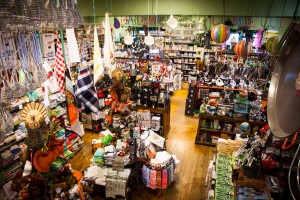 As we’re seated in her “office” – on the steps leading up to the Annex, where sale items are – a slender bearded chef comes up to us. “Hi, Louise,” he says. “I’m looking for a particular kind of mold, and wondered if you had it.” Before he’s finished describing it, Meyers rises immediately and shows him what she has in stock, which happens to be silicone versions of the molds. “Yeah, I tried those, but they’re not working for me,” the chef says.
As we’re seated in her “office” – on the steps leading up to the Annex, where sale items are – a slender bearded chef comes up to us. “Hi, Louise,” he says. “I’m looking for a particular kind of mold, and wondered if you had it.” Before he’s finished describing it, Meyers rises immediately and shows him what she has in stock, which happens to be silicone versions of the molds. “Yeah, I tried those, but they’re not working for me,” the chef says.
“Let me special order them for you,” she says. “They’ll be here within a couple of days.”
The chef says he’ll think about it, and wanders off.
“He won’t find those anywhere else,” she says. “A lot of chefs and bartenders buy from us, because we have – or can get –stuff they need but can’t find.”
Doing it the Old-Fashioned Way
Amazingly, Pryde’s is not computerized in any way. Staff people still hand-write receipts, and Meyers says she carries the inventory of hundreds of thousands of items in her head. She works on the floor of the store every day, and tracks inventory that way, she says.
“I didn’t want to get into a situation where I was spending all my time at a desk, staring at a computer,” she says. “And oddly enough, this works fine for me.”
With sales of about $1.8 million annually, Pryde’s seems to be doing just fine with Meyers’ idiosyncratic system.
New Online Kitchenware Retailer Seeks to Solve Stress
Last year, the American Psychological Association (APA) reported 52 percent of Americans feeling a significant amount of stress as they ponder on the future of the nation, their work and their family’s financial stability. Online kitchenware retailer ToBox.com claims to have the solution to all this stress.
ToBox.com launched January 1, 2018 selling essential kitchenware and home goods priced up to 40 percent less than even the top brands with their best discounts. The goal is to bring consumers the same quality that they grew up with or that they see on shelves in stores — without all the extra costs of having a brand name on it or all that stress created by the experience of wandering among the aisles of a first-class kitchen store, fingering the gadgets, watching the demonstrations and chatting with knowledgeable and friendly experts while dreaming up meal plans for spectacular Instagram success.
By establishing relationships with factories that manufacture many of the shoppers’ existing kitchen tools and then curating an assortment of only the best quality items, ToBox says the company can deliver to customers just what they need at affordable prices. All products are stringently tested by strangers on the Internet for harmful materials, best factory practices and simplicity to use.
“What we want to set us apart from the other consumer goods companies out there is our teams investment into the community. We plan on putting our money where our heart is in 2018 by joining hands with a lot of great organizations, putting a major focus on how we can give back,” says Diandrah Lamarche, ToBox’s Head of Marketing.
Food Producers Contribute to Communities to Change the World
By Lorrie Baumann
After wildfires devastated northern California’s wine country, Bellwether Farms was ready to help with a matching gift through its Bellwether 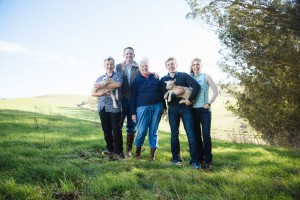 Farms Foundation. The wildfires have caused at least $3 billion in insured losses, according to the Los Angeles Times, which quoted state Insurance Commissioner Dave Jones, who noted that the loss tally was likely to grow as more claims were reported by insurers. More than 40 people died in the fires, and about 15,000 homes and businesses were damaged or destroyed by the most destructive wildfire in California’s history.
Farms Foundation. The wildfires have caused at least $3 billion in insured losses, according to the Los Angeles Times, which quoted state Insurance Commissioner Dave Jones, who noted that the loss tally was likely to grow as more claims were reported by insurers. More than 40 people died in the fires, and about 15,000 homes and businesses were damaged or destroyed by the most destructive wildfire in California’s history.
The Bellwether Farms Foundation’s offer was a $25,000 dollar-for-dollar matching grant to provide a total of up to $50,000 to organizations providing direct assistance to northern California communities through food donations and support for recovery. Organizations receiving funds from the grant include the Redwood Empire Food Bank.
Bellwether Farms Foundation, a 501(c)3 nonprofit charity, is in its first year of operations, set up by the Callahan family, owners of Bellwether Farms, which makes award-winning cheeses and yogurts in Sonoma County, California, to donate to charitable efforts, mostly related to hunger relief and food-related education for children. Callahan, the family-owned company’s Cheesemaker, says that the idea for the foundation came as he was reading about other companies that were actively seeking involvement with their communities and customers that went further than fundraising for causes in the moment. “Over the last couple of years, I was starting to think of ways to do a little more than just make cheese and yogurt,” he says. “We had always donated cheese and yogurt to local schools, the food bank, international organizations with local chapters — most of those were typically the smaller organizations that needed cheese for auctions at their main fundraising events.”
The Callahan family decided to pledge 1 percent of their sales to the foundation and then began figuring out how to get the money to the organizations working for causes they also wanted to support. They started by teaming up with the Whole Foods Foundation, which already had a mechanism in place to support better food options for children, which was a cause that the Callahans wanted to support. The Redwood Empire Food Bank, the largest hunger-relief organization serving north coastal California, from Sonoma County to the Oregon border, was another.
Bellwether Farms has also begun labeling its products with the Bellwether Farms Foundation’s mission statement. “We hope that people will think about these sorts of things when they shop and find ways to get involved,” Callahan said. “The package space is precious space, so I hope that the message there will be something that reaches the people who buy and enjoy Bellwether Farms products. … The food industry has to be part of the solution. We’re not going to solve the digital divide, but we can help with getting food to people and raising awareness about the problem.”
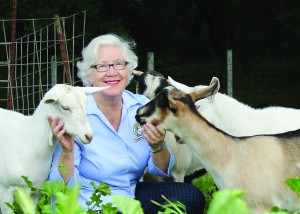 Not far up the highway from Bellwether Farms, Jennifer Bice, who sold her Redwood Hill Farm & Creamery to Swiss dairy company Emmi in 2015, has also been thinking about how her financial resources can make a greater impact on her community. This year, she started the Jennifer Bice Artisan Dairy/Cheesemaker Grant Award, which she intends to be a yearly award to a member of the California Artisan Cheese Guild who will use the money for creamery or farm infrastructure or for education that relates to improving farming or business practices. Bice, who will step down from overseeing day-to-day operations at the company in a few years, views the annual grant program as another form of succession planning to make sure that artisan cheesemaking will continue in her name even after she has retired to her goat dairy farm, which was not included in the sale. She is also giving regular cheesemaking workshops at her farm. “As I come into retirement, and I’ve enjoyed my business of raising dairy goats and making cheese, I wanted to find a way to mentor young and upcoming cheesemakers,” she says. “I’ll be retiring back to my farm, where I have 300 goats, chickens, an apple orchard, an olive grove, and a hopyard, so there’s a lot of work on a farm. I’m looking forward to being more of a farm girl.”
Not far up the highway from Bellwether Farms, Jennifer Bice, who sold her Redwood Hill Farm & Creamery to Swiss dairy company Emmi in 2015, has also been thinking about how her financial resources can make a greater impact on her community. This year, she started the Jennifer Bice Artisan Dairy/Cheesemaker Grant Award, which she intends to be a yearly award to a member of the California Artisan Cheese Guild who will use the money for creamery or farm infrastructure or for education that relates to improving farming or business practices. Bice, who will step down from overseeing day-to-day operations at the company in a few years, views the annual grant program as another form of succession planning to make sure that artisan cheesemaking will continue in her name even after she has retired to her goat dairy farm, which was not included in the sale. She is also giving regular cheesemaking workshops at her farm. “As I come into retirement, and I’ve enjoyed my business of raising dairy goats and making cheese, I wanted to find a way to mentor young and upcoming cheesemakers,” she says. “I’ll be retiring back to my farm, where I have 300 goats, chickens, an apple orchard, an olive grove, and a hopyard, so there’s a lot of work on a farm. I’m looking forward to being more of a farm girl.”
This year’s award recipient of the $10,000 gift, Erika McKenzie-Chapter, was chosen from a field of 10 proposals. “All of them were great prospects,” Bice says. “The recipient this year is a talented young cheesemaker. She makes beautiful farmstead cheese at her creamery, which is called Pennyroyal Farm.”
Pennyroyal Farm, home to more than 100 goats, was named for the wild pennyroyal mint that carpets the 60-acre farmstead and vineyard in Anderson Valley. McKenzie-Chapter began making farmstead goat cheese there in 2012, while her business partner, Sarah Bennett, oversees the vineyard, a flock of chickens, and a tasting room that sells their cheese and wine. McKenzie-Chapter is using the Bice grant to purchase equipment that will improve productivity and efficiency on the farm and allow for increased production of the Pennyroyal Farm cheeses. “Her process calls for treating the milk very gently, and this custom-built milk tank [purchased with the grant] will allow her to improve her efficiency while still handling the milk delicately,” Bice says. “She knows each of her goats by name, like I do in my herd.”
“In some ways, Erika reminds me of myself,” she adds. “It takes a lot of gumption to keep going with limited resources, but when you’re really passionate about your business and about your goats, that really resonates with people.”
Across the country in Maine, Aaron Anker, Chief Granola Officer of GrandyOats, thinks of having a greater impact on his community and the world around them both in terms of providing employment in a rural area of western Maine that doesn’t have a lot of other jobs to offer and by converting the company’s power source to solar energy as well. “We’re also partnering as much as we can with organizations like the Audubon Society and other land conservation organizations. I think it’s what feels right, so you do it,” he says. “Supporting environmental causes and local organizations has been part of our mission since the company started. We’ve always tried to help out. It’s not just a local thing – it’s also global, when you’re sourcing organic ingredients from around the world, it is essential that you’re not polluting those places.”
The company installed its 288 solar panels in the fall of 2015 while moving operations into an abandoned elementary school that had been a blight in the community. The solar panels went into the ball field where the youngsters used to play, and two years into their operation, the panels are creating more than 100,000 Kilowatt-hours of electricity, and the company is on track to power most of its facility from that output. “When we opened the school, we put in a higher efficiency cooling system, efficient ovens, electric forklifts. We removed all fossil fuels from the premises,” Anker says. “The idea that we’re going to change the world as one small company is true.”
While these companies started with businesses, Dignity Coconuts is a food business that started with a mission. The company started in 2010 as a nonprofit working in the Philippines on poverty and modern-day slavery, then turned to business as a way to help solve these social problems. “We asked, ‘What do you have that we can build a business around?’” says Dignity Vice President Erik Olson. “They said, ‘We have lots of coconuts.’”
Dignity went to work on building a business around coconuts and found a way to make a better coconut oil, avoiding the conventional cold press, which produces oil with a heavy coconut flavor and which belies its name by heating the oil to 160 degrees or more, according to Olson. “Most do not want every dish to taste like coconut,” he says. Dignity oil is produced from certified organic coconuts, using a centrifuge that spins the coconut cream to separate the oil. “We found this method produces a mild taste and smell and is a truly raw product you can’t get from other methods,” Olson says.
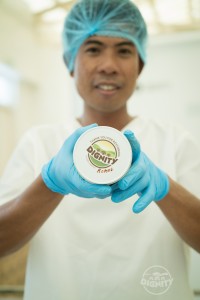 The company sells the oil in 4-ounce jars that retail for $5.95 and 15-ounce jars that retail for $14.95. Lids of the jars are signed by members of the staff in the rural Philippines, and revenue from the sales is used to transform rural communities with high unemployment, few educational opportunities and a lack of clean drinking water. According to the company, workers are paid a fair wage, farmers are paid above-minimum prices for their coconuts, employees have ownership options, and the staff and management are always more than 50 percent women.
The company sells the oil in 4-ounce jars that retail for $5.95 and 15-ounce jars that retail for $14.95. Lids of the jars are signed by members of the staff in the rural Philippines, and revenue from the sales is used to transform rural communities with high unemployment, few educational opportunities and a lack of clean drinking water. According to the company, workers are paid a fair wage, farmers are paid above-minimum prices for their coconuts, employees have ownership options, and the staff and management are always more than 50 percent women.
“It’s not going to stop here. We have structured our plan to make it reproducible. We are going to build more and more plants all over the world. There are plenty of coconuts to harvest out there!” the company says on its web site. “And it won’t be confined to coconuts. We want to go to communities and ask them what they have. Then we will build our business based on our values and their resources. We have a big dream for the future. Dignity is going to change the world.”
If You Can’t Find It at Willey’s Store, You Don’t Really Need It
By Lorrie Baumann
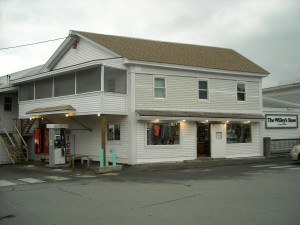 The Willey’s Store is as much a social and cultural hub for the small town of Greensboro, Vermont, as it is a country mercantile that stocks hardware and clothing as well as grocery staples and a selection of specialty foods that includes what Cheesemaker Mateo Kehler acknowledges as the best display of Jasper Hill cheeses in the country. The clothing, the hardware and the grocery staples appeal primarily to the community’s 600-700 full-time residents, while the fancier food adds to the joy of a summer house on the lake for the thousands of vacationers who flood into Greensboro every year between Memorial Day and Labor Day.
The Willey’s Store is as much a social and cultural hub for the small town of Greensboro, Vermont, as it is a country mercantile that stocks hardware and clothing as well as grocery staples and a selection of specialty foods that includes what Cheesemaker Mateo Kehler acknowledges as the best display of Jasper Hill cheeses in the country. The clothing, the hardware and the grocery staples appeal primarily to the community’s 600-700 full-time residents, while the fancier food adds to the joy of a summer house on the lake for the thousands of vacationers who flood into Greensboro every year between Memorial Day and Labor Day.
Rob W. Hurst is the fifth-generation storekeeper at the Willey’s Store. “My grandmother was born in a room right above the cash registers,” he says.
His title has been President and Chairman of the Board since 2010, when he gave up his corporate job in the information technology department at Central Vermont Public Service to take over the store. “It’s what I wanted to do when I was younger,” he says of his decision to come home to Greensboro and mind the store. “Anyone I worked for when I was younger, I always told them that if I ever got a chance to come home, I would. Greensboro takes pride in the store, and Greensboro is growing at the same time.”
Greensboro began as a blockhouse along the Bayley Hazen Military Road, which was built by George Washington’s order in the anticipation that it might be needed if the Continental Army staged an invasion of Canada. Today, the name of that road has been memorialized by Bayley Hazen Blue, a Cellars of Jasper Hill cheese that was honored in 2014 as the “World’s Best Unpasteurized Cheese” at the World Cheese Awards.
That cheese and others from Cellars at Jasper Hill, which also calls Greensboro home, are part of the array of local products that Hurst stocks in the grocery that fills most of Willey’s Store’s ground floor. Hardware occupies the remainder of the ground floor, and an upstairs level offers clothing. Willey’s Store is a True Value hardware store and also a proud member of Associated Grocers of New England, and if you can’t find what you were looking for at Willey’s Store, chances are good that you don’t really need it. “Our specialty is definitely local products, made in Vermont,” Hurst says. “This area is very economically depressed, so not only do I have to have the premium items; I also have to have the staple groceries for those who live year-round up here.”
Other local products include cow, goat and sheep milk cheeses by three or four other farms within a few miles of the store, fresh produce, milk, yogurt, honey, chicken, pork and beef, as well as baked goods from Connie’s Kitchen and Bien Fait Bakery, which is gaining a national following for its Christmas fruitcakes. “A lot of local folks will make wreaths for the Christmas season and we sell those. We have folks who have nurseries, so we get bouquets of flowers,” Hurst says. “Our local eggs fly out of here faster than we can get them in.”
“Some national brands probably got their beginning on our shelves,” he adds. “Local movement is particularly strong up here. A lot of local folks are motivated to buy here to help us keep going, and that’s probably a huge factor in why we’ve been here for so long.”
Summer tourists buy the Cellars at Jasper Hill cheeses, Willey’s Store t-shirts and sweatshirts, toiletries in travel sizes, charging cords and cables that might have been forgotten at home as well as the groceries for their meals while they’re staying in their rental homes. Very often, those folks come in knowing that they need to shop for dinner, but they don’t have a plan for what they’ll be cooking, so Hurst and his staff do some of their merchandising around simple menus that they can suggest to their customers – very nearly a home-grown meal kit proposition in which they’ll suggest a local protein first – whatever’s on special – and then follow up suggestions for the side dishes and the wine pairing – all to help shoppers come quickly to their purchasing decisions so they can clear the store efficiently and free up a parking space outside for another customer. “Much as a restaurant depends on turning tables, we have to manage parking,” Hurst says, explaining that Willey’s Store has a few parking places in front of the building and there’s a small public parking lot across the street that also serves other nearby shops and municipal services. “If someone comes in and spends hours at the library, that’s a parking space I don’t have.”
The heavy emphasis on locally produced products helps to support the rural community that’s dependent on the dollars spent by summer tourists. They come to Vermont to spend a week or two at a time in the lakeside houses that were once family summer camps and are now mostly rental units operated by extended families who live and work elsewhere. Those families, often adult brothers and sisters who grew up spending whole summers at their family camps on the shores of Caspian Lake, now often come back to Greensboro only for the few days in spring that are required to open up the houses for the summer season and then again in fall to shut them up for the winter, leaving the town to its 600 to 700 permanent residents.
In the summertime, the town’s population swells to 2,000 or more, doubling the amount of business that comes into Willey’s Store during the week. Hurst is hoping that Kehler’s community development dreams of creating a critical mass of artisanal cheesemaking will help create a vibrant year-round economy for the small town. “As the population of Greensboro grays, there are a lot of houses on the main street that are dark because they only come up for the summer. I need to have year-round customers,” Hurst says. “By staying local and trying to edge toward the $15 min wage, employees will be able to afford to live in the area, so that every light in every house is on year-round. I have it in the back of my head as a goal, but the reality is that I have to accept the resort town mentality to keep us going.”
Depending on the time of year, 30 to 45 employees keep his five cash registers running at the front of the store. Grocery Manager Steve Collier is the 117-year-old store’s longest-serving employee. “He’s been here for at least 25 years,” Hurst said. “People know him.” Hurst himself, now 46, is the fifth generation in his family to work in the store, where he’s sometimes known as “the new Rob,” since his father, also a Rob, still works at the store too. The family’s sixth generation, Hurst’s nieces, Nakaya and Bionca Samuel, are still in college, and it’s too soon yet to know if they’ll ever join the store’s staff, Hurst says. “They’re enjoying their early 20s – out and about,” he says. “They’re enjoying life, but I did the same thing – went off to college, and it wasn’t until I was in the early 40s before I came back here.”
After the Storm, Cooking Rebuilds Community
By Robin Mather
Those of us not living through it may think the storm itself is the worst, but those who went through Hurricanes Harvey and Irma know that recovery in the storm’s aftermath is much harder.
For kitchenware manufacturers and kitchenware retailers, however, there is a small solace: Your businesses directly help your customers to rebuild community at a time when community is desperately needed.
Bill and Eden Brown, who own Isle Cook in Key West, Florida, say that they were “on the easier side of the storm.” Still, Hurricane Irma devastated their community, leaving lots of downed trees and power lines down. The Browns were lucky enough to avoid damage to both their home and their business.
“However, I will say that as a small business owner, it’s been a real hardship for us,” Bill says. “We had to evacuate more than three weeks ago, and we reopened for business Sept. 26, but there aren’t any customers because everyone here is trying to rebuild their own businesses. It’s mostly locals walking around.”
Although officials have said U.S. 1 – the only road to Key West – is all clear and its bridges all cleared for safety, and Key West International Airport reopened Sept. 20 for commercial service, Bill says that he thinks that a lot of tourists who had trips planned are cancelling those plans “because this just isn’t what they were looking for on a vacation. Most of the hotels are still closed.”
But eventually, he says, Key West – famous for its laid-back attitude – will recover. “The community is looking to heal and come together again,” Bill says. “A lot of that is going to be around food.”
Out in Houston, Texas, where Hurricane Harvey caused massive flooding, the feeling’s the same, says Heida Thurlow, Founder and President of Chantal, the 40-year-old maker of cookware based in Houston.
“Fourteen of our employees and family members were directly affected by Hurricane Harvey,” she says. “And that’s not counting me – I was evacuated from my house by a Blackhawk helicopter and taken to a hotel in Sugarland, and then had to evacuate my hotel the next day. I had nothing – no wallet, no phone, no nothing — I was wearing shorts and flip-flops when I was evacuated.” Fortunately, Heida’s daughter, who lives in Austin, Texas, secured a hotel room for her by phone, and ultimately made the drive from Austin to evacuate her mother from the Sugarland hotel.
Some Chantal employees weren’t able to return to work immediately, she says, because the roads around their houses remained flooded. But among those who could report, many employees went out to pass out water and food, and to assist in recovery efforts.
“Our corporate headquarters were not affected by either high winds or flooding,” she says. But for employees who lost their homes or their cars or both, she says, the company has set up a donations program, providing gift cards to Lowe’s or Home Depot for rebuilding, and to Safeway.
“I couldn’t get back into my house for 10 days,” Heida says. “I had to use a little paddle boat to get up the street to my house, and when I opened the door, there was still four feet of water in the house. I lost most of my own furnishings, some parts of my house are completely destroyed, and I lost my beloved 14-year-old car.”
But her own losses aren’t so important to her, Heida explains.
“So many people have lost everything, so many people will have to replace everything – and yes, that includes cookware. But we are ‘Houston Strong,’ and we’ll put our new lives together.”

You must be logged in to post a comment.